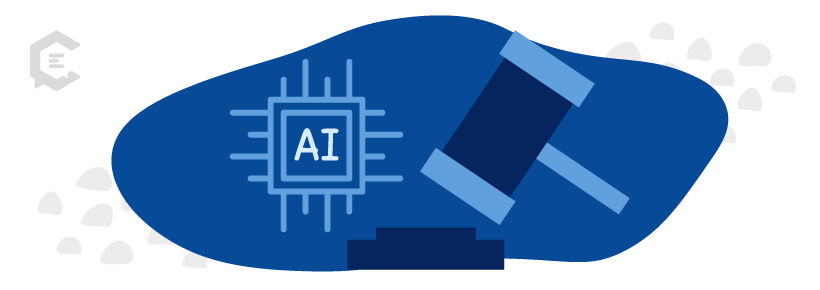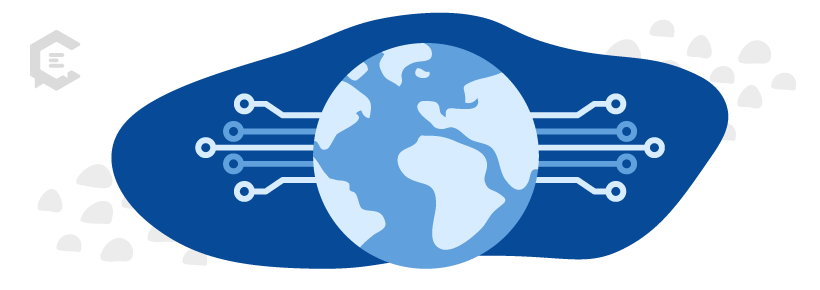Was this written by a human or a robot? Could you even tell?
In the world of content marketing, artificial intelligence (AI) has evolved from a distant possibility to a staple tool for many businesses. AI-powered content creation tools are smarter than ever.
Now, AI can create human-like text for social media, blogs, and emails.
When human writers get typing, it’s easy to see where they draw their inspiration. Usually through links, citations, or quotes.
Since AI learns from a wide variety of texts, there are no direct links. So, when do machine learning and AI content creation cross the boundary of plagiarism?
Defining Plagiarism in the Context of AI
Historically, plagiarism is the deliberate act of using someone else’s work without providing the appropriate credit.
A plagiarist passes off someone else’s words as original work. Think about copying and pasting from a website, transcribing from a textbook, or stealing someone’s quote.
When applied to AI, this definition becomes complex. AI systems learn from billions of sentences and phrases online.
When AI or machine learning programs like GPT-3 by OpenAI produce content, is it original? Or does it veer into plagiarism territory?
It’s a grey area because AI programs do not deliberately ‘copy’ human work.
Instead, machine learning works to understand:
- Content structures
- Style
- Patterns in text
Based on these inputs, an AI program produces text that is new — but not quite. Some people may consider AI content-copying since it is, at its core, derivative of other people’s work.
Legal Perspective on AI and Plagiarism
When it comes to plagiarism, concerns are not only philosophical, ethical, or hypothetical. The question of AI and plagiarism is not simply an ethical or philosophical conundrum. There are potential legal issues with AI and plagiarism.
Currently, the legal landscape surrounding AI-generated content is sparse and unclear. Most copyright laws in the US and elsewhere center on the premise of human authorship. This does not cater to content created by a machine.
In 2016, the Associated Press started to employ AI to write minor-league baseball game recaps. There were initial accusations of plagiarism, but no legal action followed. This was mostly because it remained ambiguous whether the generated content constituted a copyright violation.
The content was technically ‘new’ but based on data collected from various sources.
Other Legal Challenges to AI
While AI-generated text has not seen any legal challenges, other creative fields are already under scrutiny.
There is a class action motion against Microsoft, GitHub, and OpenAI. Plaintiffs say, Copilot, a code-generating AI system, regurgitates licensed code snippets without providing credit.
Similarly, two companies behind popular AI art tools, Midjourney and Stability AI, are in the crosshairs of a legal case. Plaintiffs allege the tools infringed on the rights of millions of artists by training theirs on web-scraped images.
Additionally, stock image supplier Getty Images took Stability AI to court. Because it reportedly uses millions of images from its site without permission to train Stable Diffusion, an art-generating AI.
The lack of legal clarity makes it essential for businesses to tread carefully.
Lawsuits and legal action can take years. The average corporate lawsuit lasts more than two years. Legal questions can go unresolved for decades if a case advances to appeals or even the Supreme Court. As the usage of AI becomes more pervasive, we can expect the legal framework to evolve and incorporate AI authorship and plagiarism.
Ethical Implications of AI in Content Creation
Beyond legal considerations, there are ethical implications regarding AI-generated content.
Content marketers value authenticity, creativity, and original thought. The introduction of AI into this space challenges these principles.
AI can potentially dilute the value of original content.
If a large number of companies are using similar AI algorithms trained on comparable datasets, the content generated could become repetitive and lose its authenticity. The implication for the content marketing industry is significant.
How do we ensure differentiation and maintain value when machines can churn out content rapidly and in large volumes?
Already, the content marketing industry can fall prey to repetition. When one topic starts generating interest, every blog seems to jump on the bandwagon — whether they have original insights to add or not.
Looking at the last 12 months on Google Trends, “AI content” was barely searched in June 2022. As of June 2023, there are more than 100 searches a day. This is leading to stale content that all says the same thing.
AI-generated content could contribute to that noise, making it harder for users to find actual value in your content.
There’s also a question of authenticity. In writing, voice and style are essential to a writer’s identity. If AI can mimic a human’s writing style, it could result in a loss of uniqueness and personal touch, which forms the core of content marketing.
Moreover, if the industry heavily adopts AI content, it could influence human-generated content. When readers recognize a typical tone or approach generated by AI, an authentic human voice could eventually stand out negatively to readers.
How to Use AI Responsibly in Content Creation
While the dialogue surrounding AI and plagiarism continues, there are practical steps content marketers can take to use AI responsibly.
Firstly, transparency is key.
If writers use AI tools in content creation, disclose this to your audience. It helps maintain trust. But also can stimulate interesting conversations about the evolving nature of content marketing.
At ClearVoice, we have an AI tools policy that ensures readers always know if writers use artificial intelligence. Hiding the use of AI can only add to concerns about the technology.
Secondly, remember that AI should supplement, not replace, human creativity.
AI can aid in automating mundane tasks, providing insights from data, and augmenting the content creation process. However, the direction, strategy, and human touch should remain with human marketers.
Even if AI is writing a huge portion of your content, there need to be real review processes in place before something goes live.
In January 2023, technology site CNET admitted that 41 of 77 stories written by AI included false information or errors. It’s possible that some of those retractions or corrections could have been avoided if there were better safeguards in place.
Finally, stay informed about the evolving legal landscape. As regulations develop, make sure your content creation practices remain compliant.
AI is Changing the World of Writing
The question of AI and plagiarism is a complex, evolving landscape. Questions of legality could take years to answer. Concerns about ethics could go on indefinitely.
Despite this, businesses must strive to maintain ethical standards when leveraging AI in content creation. We should view AI as a tool that can enhance our content marketing strategy. Not as something that can replace human creativity and ingenuity.
By fostering originality and transparency, marketers can leverage the power of AI without veering into the territory of plagiarism. In this exciting era of AI advancements, it’s up to us to shape its future in a direction that respects and enhances human creativity.
If you’re looking for ways to improve your content strategy — through AI or not — talk to the ClearVoice team about your content goals.







